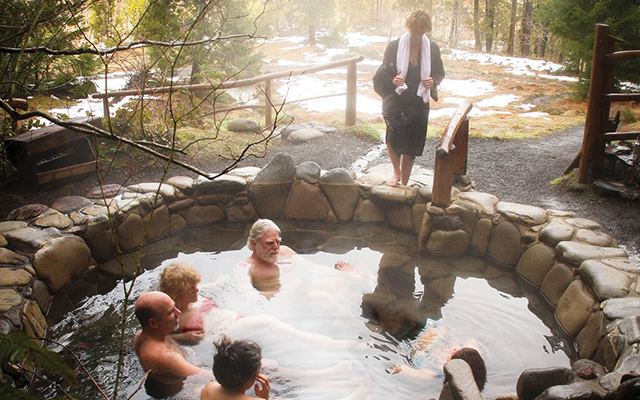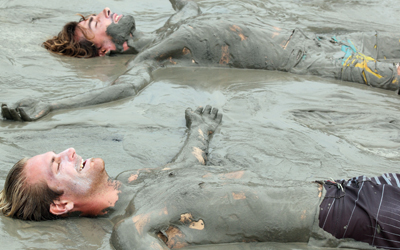It’s early January, and my mom and I have put studded tires on the Prius. We’re heading off for a postholiday detox at Breitenbush Hot Springs, a 154-acre sanctuary within Oregon’s Willamette National Forest, and the remote roads can be tough going. One of many rustic hot-springs spas across North America, Breitenbush is a simple, secluded site where guests design their own retreats by choosing from an array of restorative offerings. After a Christmas and New Year’s of endless feasting, we’re both ready for a serene retreat amid the woods and waters.
We set out under a sky promising snow and reach our turnoff just as the flakes begin to fall. We miss the fork in the road, and Mom cranks up the windshield wipers so we can see out. The high-altitude roads are all gravel and dirt, and the slush is giving the Prius a workout. We backtrack until we find the entrance.
As we arrive at Breitenbush, the snow halts, leaving the firs with heavy branches. Our boots squeak on fresh powder as we make our way to our cabin, one of 43 for rent year-round. “It’s not the Ritz, but it’s cozy in here,” my mother notes, unraveling her scarf and settling in.
There are few amenities in the wooden structure, but it is clean and welcoming. We unpack the bedding we brought from home. And we place our essentials in the cupboard: chocolate with raspberries, crackers, cheese, and my mother’s coffee stash. Mom warns me to protect the food well: “We don’t want uninvited bunkmates,” she says, reminding me of a previous visit when chipmunks gnawed their way into our trail mix.
Off the Grid
At Breitenbush, simple accommodations start around $56 a night per person. This includes three organic meals at the lodge, unlimited access to the mineral springs, and the opportunity to join daily “well-being programs.” In theory, one could have an all-inclusive weekend trip for $112 — which in itself is a kind of stress relief.
This time we’ve splurged on a deluxe cabin for $93 per person. “Deluxe” here means a private bathroom (toilet and sink), two full beds, a sitting area, and electricity. The retreat center is off the grid, producing geothermal heat for its 100 buildings from a small hydroelectric plant. Resources are limited and allocated with care. Water is taken from Breitenbush River and treated for drinking. The hot springs are all natural.
Feeding the Soul
We hear the Breitenbush lunch bell reverberate through the trees. Wool hats on, it’s a five-minute walk to the 1930s lodge. Inside, we strip off layers and knock snow from our boots before grabbing plates to pile high at the buffet.
We read the day’s menu, which is a measure heartier than typical spa food: vegetarian chili, quinoa with sautéed vegetables, salad bar, fresh cornbread, and mint tea. Everything looks delicious.
The kitchen is entirely vegetarian (gluten-free and vegan options are available) and alcohol is expressly forbidden. They don’t serve coffee, but visitors can bring beans and a French press from home. (Hence our stash back at the cabin.)
Over lunch Mom and I discuss the schedule. We decide to attend the well-being program after lunch, followed by massages, dinner, and a soak in the springs. Perhaps we’ll check out the evening entertainment — or not. It’s nice to have the option.
The chance to choose from a roster of daily collective activities is common at rustic spas. At Harbin Hot Springs in Middletown, Calif., guests can select from yoga classes, dancing, concerts, qigong, or tai chi.
At Sierra Hot Springs, also in northern California, visitors can take water yoga in the warm pool and enjoy evening concerts. Here at Breitenbush, today’s activities include early-morning meditation, late-morning and afternoon yoga, and storytelling after dinner. Programs are included in the guest rate. Breitenbush also hosts more than 150 wellness-oriented workshops, conferences, and events yearly.
Lisa Mae Osborn, owner of the Bhaktishop Yoga Center in Portland, Ore., has been teaching yoga workshops at Breitenbush since 2007. She especially appreciates the remoteness of the setting. “Think total and complete shutoff from the world. The lack of Internet service is unique, even among the retreat centers we go to in Mexico and Costa Rica and Bali,” she says.
Like us, Osborn has also experienced wild weather. “Our retreat in 2012 was snowed in. There was so much snow overnight that no one could leave and the cars in the parking lot were buried. It was an extreme communal effort to dig them out, and everyone was so happy and joyful doing it.”
Simple living, it seems, has many rewards.
Sacred Waters
Mom and I relish any spa retreat, including the more conventionally luxurious, but we appreciate the simplicity here. Breitenbush and similar rustic retreats, like Harbin Hot Springs and Carson Hot Springs Golf & Spa Resort in Carson, Wash., offer a laid-back approach to R & R. These sites are not posh, and no one dotes on you, but this can be refreshing — especially if excessive pampering makes you cringe.
Three days of soaking, hiking, and massages at a rustic spa can usually be had for under $300. One day at a high-end spa can easily cost that — or much more. We look forward to massages at Breitenbush for weeks. At $100 for 90 minutes, these are a splurge, but they’re a fast track to deeper relaxation.
When we arrive at our appointments, my therapist shows me to a room overlooking the river, a powerful swirl of whitewater this time of year. I’ve booked a hot-stone treatment, and as it begins, I listen to the torrent rush and I slip into a peaceful trance. The water here has its effects even when we’re not soaking or steaming in it.
Afterward, we make our way across the meadow and past what looks like a hobbit’s house, with vapor coming out its chimney. This is the steam sauna, perched atop a bubbling hot spring, and a few red-faced bathers can be seen through the mist.
Many hot springs that anchor rustic spas were originally used by Native Americans; Breitenbush was a gathering site for a nearby Native American village for several thousand years. People from the area spent time at the springs, as did the Santiam branch of the Kalapuya tribe. The most important duty of the collective that has run Breitenbush over the past three decades is protecting these sacred waters.
After dinner we heed their call. Enveloped in the forest are the Spiral Tubs: four pools set in a circle, with progressively hotter water. Three other sacred pools sit near the river, where fern and moss hang like prayer flags from wet earth. A cold-plunge pool is nearby, but during our winter stay, we ignore it and leap directly from the hot pools into the new-fallen snow.
Where to Go
The following locations all offer affordable accommodations with access to hot springs. They’re ideal places to design your own restorative retreat.
Breitenbush Hot Springs: Detroit, Oregon
- Simple dorm cabins
- Starting at $56 per night
- Hot springs, sweat lodge, hiking trails, and more.
Miracle Hot Springs: Buhl, Idaho
- Queen-size geodesic dome tent, $59 per night
- 15 private pools, six VIP pools, and four public pools
- Lodging options include fully furnished geodesic domes with heated floors
- Massage available
Stewart Mineral Springs Retreat: Weed, California
- $45 per night for teepee accommodation; $90–$110 per night for cabins
- Sleep in a traditional teepee or a cabin and gain free access to the sauna; the mineral springs and traditional bathhouse are a small additional charge.
- Day passes are also available.
Carson Hot Springs Golf & Spa Resort: Carson, Washington
- Hotel accommodations start at $75 per night
- A mineral bath and wrap in the 1930s bathhouse costs only $20.
- Access to the excellent Elk Ridge Golf Course is included.
Harbin Hot Springs: Middletown, California
- $80–$100 for tent cabin
- These sacred springs are surrounded by 5,000 acres of woodland, located only two hours from San Francisco.
Riverbend Hot Springs: Truth or Consequences, New Mexico
- $70 for a queen-size Artist room
- The only open-air hot springs on the banks of the Rio Grande River.
- Book a private pool for only $10.
Faywood Hot Springs: Faywood, New Mexico
- $99 for private cabin
- RV and tent camping also available
- An oasis in the middle of the Chihuahuan Desert, perfect for stargazing.
Strawberry Park Hot Springs: Steamboat Springs, Colorado
- $60–$115 per night
- The mineral water in the terraced stone pools lingers around 104 degrees F,even when there’s snow on the ground.
- Spend the night in a covered wagon for $60 or splurge on accommodations in a converted caboose for $115.
- Massage available.


This Post Has 0 Comments